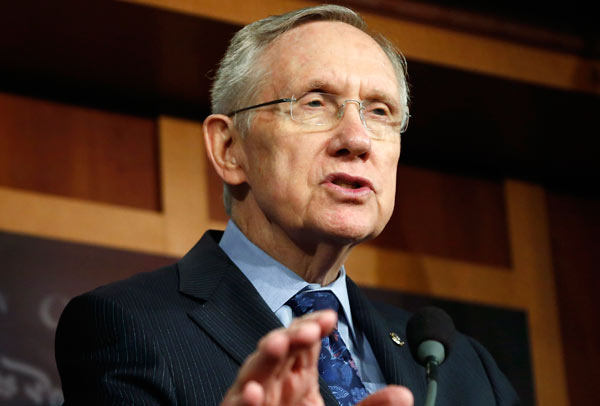Senate leader 'confident' fiscal crisis can be averted
 |
|
US Senate Majority Leader Harry Reid (D-NV) addresses reporters at a news conference at the US Capitol in Washington, October 12, 2013.[Photo/Agencies] |
WASHINGTON - Senate Majority Harry Reid said Sunday that he was engaged in negotiations with Republican Minority Leader Mitch McConnell and was "confident" they could resolve the fiscal crisis confronting Washington.
"We're in conversation today," Reid said on the Senate floor.
"I'm confident that Republicans will allow the government to open and extend the ability of this country to pay its bills. And I'm going to do everything that I can throughout the day to accomplish just this."
Reid offered no specifics however and McConnell remained out of sight.
"It's moving. Not sure in what direction," said Reid of the discussions as he walked into the US Capitol building on Sunday morning and was asked how negotiations were progressing.
While both Republicans and Democrats in the Senate, and now the US House of Representatives, appear in agreement that the debt ceiling should be raised and the government reopen, they remained at loggerheads over the terms for doing so, including the duration of the debt ceiling increase and levels of funding for the government.
The US government has been partially shut down since Oct 1, following the refusal by Republicans to approve a funding measure unless President Barack Obama and his Democrats agreed to defund or delay Obamacare, the president's signature healthcare law.
That conflict has since merged with the Thursday deadline for Congress to increase the government's borrowing authority or risk default. Investors around the world are watching the drama unfold and while US stocks rose late last week on hopes for a possible deal this weekend, analysts predicted the mood could turn bearish without signs of progress.
DOWN TO THE WIRE?
While other US lawmakers also expressed optimism Sunday that they could avoid a possible default, efforts to do so appeared to be moving slowly and headed down to the wire.
The Republican-controlled US House, where one of Washington's most bitter conflicts in years began in early September, was out of the picture entirely Sunday, by design.
Obama as well as the Senate gave up on the House Saturday, after Democrats and Republicans alike concluded that the demands coming from conservatives who dominate the Republican caucus and general disunity offered little grounds for ending the crisis.
"They're not part of this at this point," Durbin said. "They can't agree among themselves about what they want to have done in this negotiation."
They remained acutely aware, however, that any solution developed in the Senate will have to be approved by the House and probably very quickly.
"Here's what I'm worried about," Republican Senator Lindsey Graham told ABC's "This Week," "a deal coming out of the Senate that a majority of Republicans can't vote for in the House."
"I'm hopeful that the House can get their act together," Republican Senator Kelly Ayotte said on CBS's "Face the Nation."
House leaders spoke bitterly Saturday of the prospect of being "jammed" later in the week: put in a situation by the Senate and possibly by market turmoil of having to rush something through at the last minute, probably with the votes of Democrats as well as the Republican majority.
Reid and Durbin suggested Saturday that it might take pressure from the markets to bring the disagreement to an end.
BEARISH MARKETS
Financial market analysts said they also saw turmoil ahead if US politicians failed to reach a deal.
"This continual breakdown in talks likely won't have a positive effect on the markets," said Bonnie Baha, senior portfolio manager at DoubleLine Capital in Los Angeles.
"There will probably be a negative reaction in the stock market but I think the pressure is really shifting to Washington now," said William Larkin, fixed income portfolio manager at Cabot Money Management in Salem, Massachusetts.
With the government shutdown set to enter its third week, US stock investors are seen as likely to turn bearish amid concerns no resolution to the crisis will emerge until Thursday.
The S&P 500 stock index generated two days of strong gains in advance of the weekend on hopes that an agreement to raise the $16.7 trillion federal borrowing limit was near.
Washington's debt ceiling drama played out as anxious global financial leaders gathered in the US capital for annual meetings of the International Monetary Fund and Group of 20 major industrialized and emerging economies.
World Bank President Jim Yong Kim on Saturday warned the United States was just "five days away from a very dangerous moment" unless politicians produce a plan to avoid default.
"If this comes to pass, it could be a disastrous event for the developing world, and that will in turn greatly hurt developed economies as well," he told reporters after a meeting of the bank's Development Committee.
- Senate leads hunt for shutdown and debt limit deal
- US fiscal negotiations sputter as deadline nears
- Obama says he'll negotiate once 'threats' end
- US still in deadlock, but glimmers of hope emerge
- Debt ceiling deadline looms over US Congress
- White House open to short-term hike in debt limit
- Boehner: US on path to default if Obama won't negotiate





















